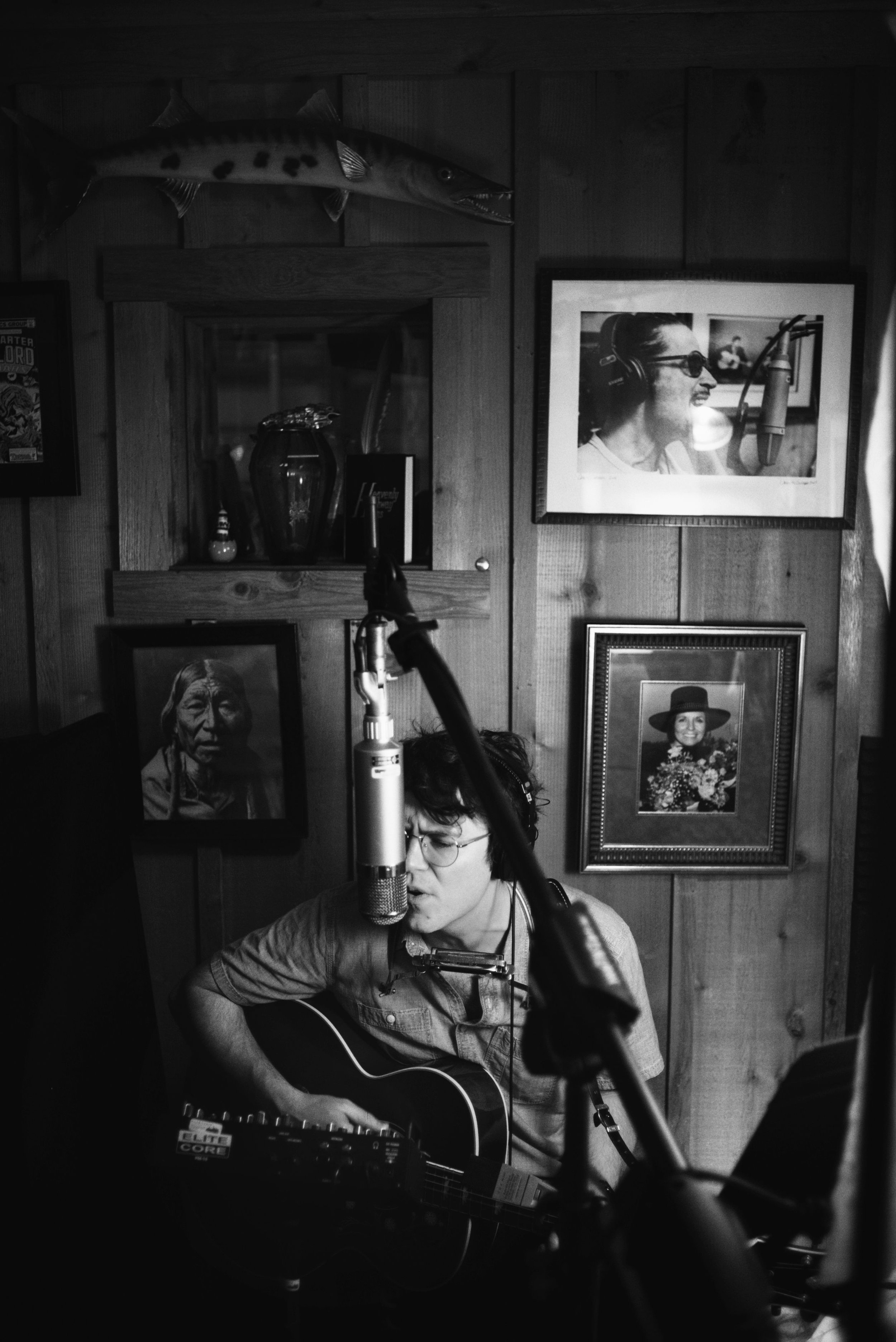Music Review: Trapper Schoepp, “Siren Songs”
The rootsy Wisconsin singer-songwriter’s new album captivates with Irish-influenced songs of love and the sea.
Trapper Schoepp is a storyteller. Both in his songs and between them in live performances, he seemingly never tires of telling stories—his own and those he witnesses, learns about and dreams up.
So it’s fitting that the Milwaukee, Wisconsin-based singer-songwriter’s new album, Siren Songs (out April 21), has a rich backstory of its own. Recorded at Johnny Cash’s storied retreat the Cash Cabin, with album cover artwork captured by Cash’s grandson Joseph—depicting Schoepp sitting in a pond whose organic matter includes disintegrated letters from Bob Dylan that Johnny would read and dispose of there—the record is already fascinating before a single note is played.
The intrigue continues as the rootsy country rocker reveals another side to his music, a strong Irish folk feel woven throughout the album, from the instrumentation (tin whistle and open guitar tuning) to the traditional ballad structure of several of the songs, to the wild and wistful stories he recounts in the lyrics. Stories of new love, separation and yearning recur throughout, along with water settings and imagery, from rivers to oceans to waterfalls.
Schoepp says he took comfort in listening to Irish folk music during the pandemic: “There’s an uplifting quality in this tradition that can break your heart and make you laugh at the same time.” Four tracks in particular—“Secrets of the Breeze,” “7 Mile Fair,” “Anna Lee” and “Eliza” —most profoundly embody the Irish folk sound. They also epitomize the themes of Siren Songs; the first extols the beauty and danger of a body of water and the latter three are love stories about a first meeting, declaring love and being forced apart.
The rest of the tracks feature Schoepp’s trademark Americana sound, from the fun swampy blues of “Devil’s Kettle” (about a mysterious Wisconsin river) to the 70s-folk-rock feel of “The Fool” (featuring words of advice to a hapless young lover). “Good Graces” pulls together the Irish influence and the spirit of Johnny Cash, with a melody reminiscent of “Will the Circle Be Unbroken” and the subtle drone of Cash’s antique harmonium organ providing a somber counterweight to warbling tin whistle and jangling guitar and banjo. The enigmatic lyrics speak to a crossroads in universal terms that could relate to anything from whether to stay in a marriage to whether society will choose the path of progress: “There are two roads / We may go down … We may falter / Or we may rise up.”
Schoepp’s storytelling range shines in the other five tracks, which relate tales fictional and historical. “Cliffs of Dover” speaks to a war veteran suffering from PTSD: “Brother, don’t you know / We were bound to lose? / And now you’re lying in bed / With them Baghdad blues.” The refrain echoes the World War II hit by Vera Lynn: “There will always be bluebirds over / The white cliffs of Dover.” There’s pathos in thinking those words of hope are nearly a century old and yet the world seems no closer to peace.
The somewhat more lighthearted “Diocese” relates a young woman’s journey fleeing the confinements of Catholic school to seek freedom in the big city, though the memories continue to haunt her:
She still feels the ruler on her wrist
The smell of incense makes her sick
She left room for the Holy Spirit
Until the day she was taught to fear it
“Silk and Satin” is a sweet and romantic fictional tale of a Manhattan businessman by day, Brooklyn drag queen by night who finds love in that double life. Aquatic and maritime metaphors about his transformation call to mind “The Little Mermaid” as he dons a completely different persona and leaves one world for another to captivate a lover.
Based on a historical figure, “Queen of the Mist” tells of Annie Edson Taylor, who at 63 became the first person to survive going over Niagara Falls in a barrel, a reckless attempt to gain fame and fortune. Although the story is extremely specific and historically accurate, it also speaks a poignant universal truth about the lengths people sometimes go to try to escape poverty, and how the reality of being poor can be more frightening than the prospect of death:
They called it suicide
But she was afraid to die
To die in the poorhouse young
Siren Songs ends, appropriately enough, on the ocean with the piano-driven ballad “In Returning.” Schoepp’s voice is at its gentlest and most emotional as the narrator stands on the deck of a boat contemplating the magic and misery of being at sea, wondering if the life and loved ones they left behind will be the same when they return:
I lift my head to a red, red morning
The kind of skies I have learned to take warning
And I’m looking out from the upper deck
With your Saint Christopher dangling down my neck
That closing image brings together many of the themes and metaphors that reverberate throughout the album. Over the course of 12 distinctive songs telling a diverse range of stories, Siren Songs achieves a cohesive thematic feel thanks to Schoepp’s deft songwriting, sincere delivery and endlessly curious storyteller’s mind.
Carol Roth is a full-time marketing copywriter and the primary music journalist and social media publicist for Adventures in Americana. In addition to studying the guitar and songwriting, Carol’s additional creative side hustle is writing self-proclaimed “trashy” novels under the pseudonym T.A. Berkeley!



